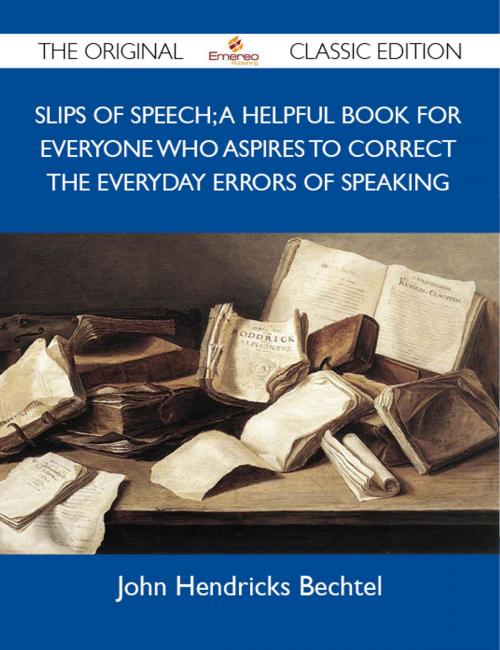Slips of Speech; A Helpful Book for Everyone Who Aspires to Correct the Everyday Errors of Speaking - The Original Classic Edition
Nonfiction, Reference & Language, Reference, Fiction & Literature| Author: | Bechtel John | ISBN: | 9781486414567 |
| Publisher: | Emereo Publishing | Publication: | October 24, 2012 |
| Imprint: | Emereo Publishing | Language: | English |
| Author: | Bechtel John |
| ISBN: | 9781486414567 |
| Publisher: | Emereo Publishing |
| Publication: | October 24, 2012 |
| Imprint: | Emereo Publishing |
| Language: | English |
Today all men speak, and most men write, but it is observed that those who most closely follow Homer?s method of writing without rules are most unlike Homer in the results. The ancient bard was a law unto himself; we need rules for our guidance.
Rules of writing are the outgrowth of the study of the characteristics and qualities of style which distinguish the best writers from those of inferior skill and ability. Grammarians and rhetoricians, according to their several lines of investigation, set forth the laws and principles governing speech, and formulate rules whereby we may follow the true, and avoid the false. Grammar and rhetoric, as too often presented in the schools, are such uninviting studies that when 4 school-days are ended, the books are laid aside, and are rarely consulted afterward.
The custom of formally burning the text-books after the final examinations? a custom that prevails in some institutions? is but an emphatic method of showing how the students regard the subjects treated in the books. 2 If all the rules and principles had been thoroughly mastered, the huge bonfire of text-books in grammar and rhetoric might be regarded a fitting celebration of the students? victory over the difficulties of ?English undefiled.?
But too often these rules are merely memorized by the student for the purpose of recitation, and are not engrafted upon his everyday habit of speech. They are, therefore, soon forgotten, and the principles involved are subject to daily violation.
Hence arises the need of books like SLIPS OF SPEECH, in which the common faults of speakers and writers are pointed out, and the correct use of words shown. Brief and informal in treatment, they will be read and consulted when the more voluminous textbooks will be left untouched.
The copious index appended to this volume will afford a ready reference to the many subjects discussed, and will contribute greatly to the convenience and permanent value of the book.
Today all men speak, and most men write, but it is observed that those who most closely follow Homer?s method of writing without rules are most unlike Homer in the results. The ancient bard was a law unto himself; we need rules for our guidance.
Rules of writing are the outgrowth of the study of the characteristics and qualities of style which distinguish the best writers from those of inferior skill and ability. Grammarians and rhetoricians, according to their several lines of investigation, set forth the laws and principles governing speech, and formulate rules whereby we may follow the true, and avoid the false. Grammar and rhetoric, as too often presented in the schools, are such uninviting studies that when 4 school-days are ended, the books are laid aside, and are rarely consulted afterward.
The custom of formally burning the text-books after the final examinations? a custom that prevails in some institutions? is but an emphatic method of showing how the students regard the subjects treated in the books. 2 If all the rules and principles had been thoroughly mastered, the huge bonfire of text-books in grammar and rhetoric might be regarded a fitting celebration of the students? victory over the difficulties of ?English undefiled.?
But too often these rules are merely memorized by the student for the purpose of recitation, and are not engrafted upon his everyday habit of speech. They are, therefore, soon forgotten, and the principles involved are subject to daily violation.
Hence arises the need of books like SLIPS OF SPEECH, in which the common faults of speakers and writers are pointed out, and the correct use of words shown. Brief and informal in treatment, they will be read and consulted when the more voluminous textbooks will be left untouched.
The copious index appended to this volume will afford a ready reference to the many subjects discussed, and will contribute greatly to the convenience and permanent value of the book.















